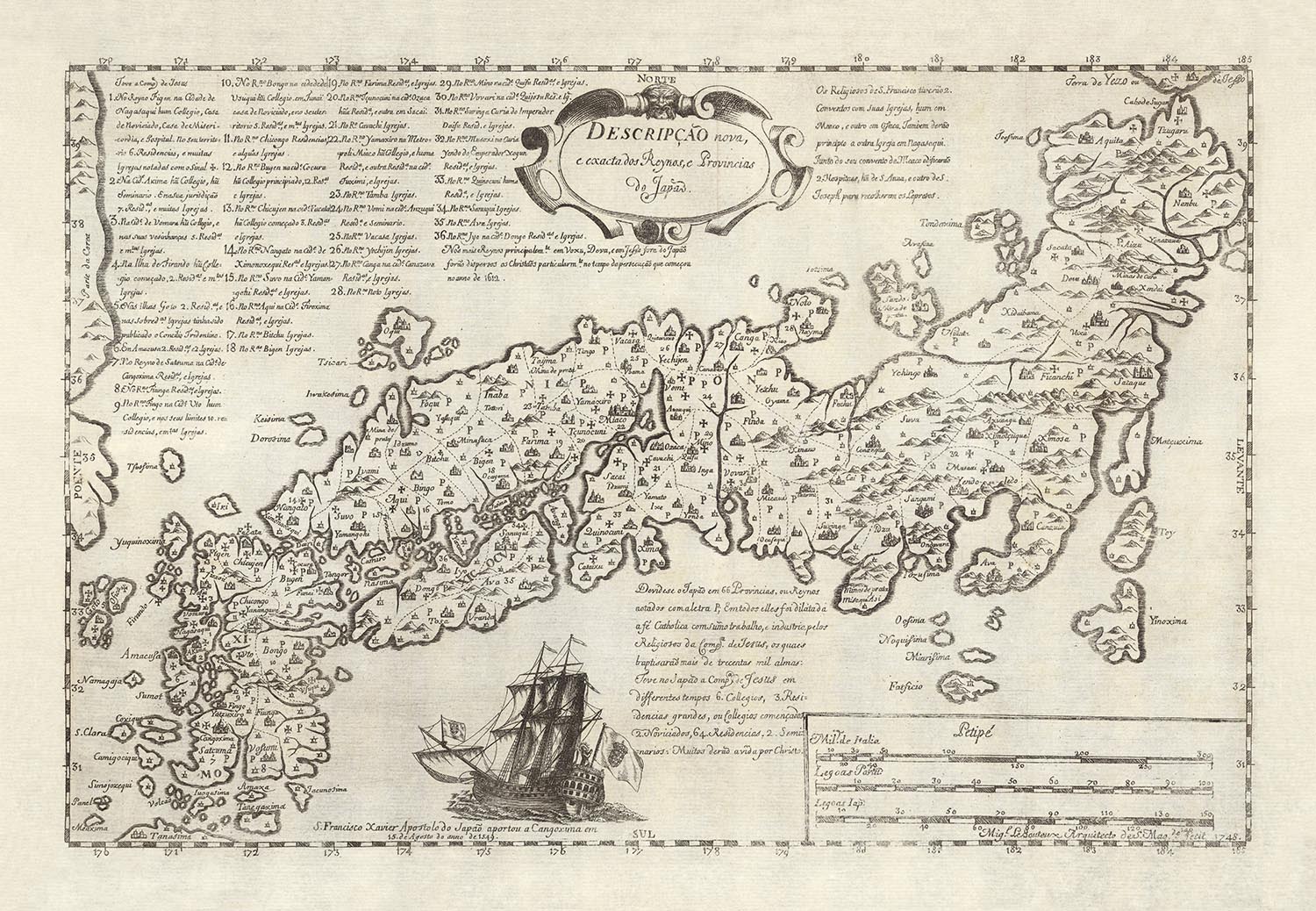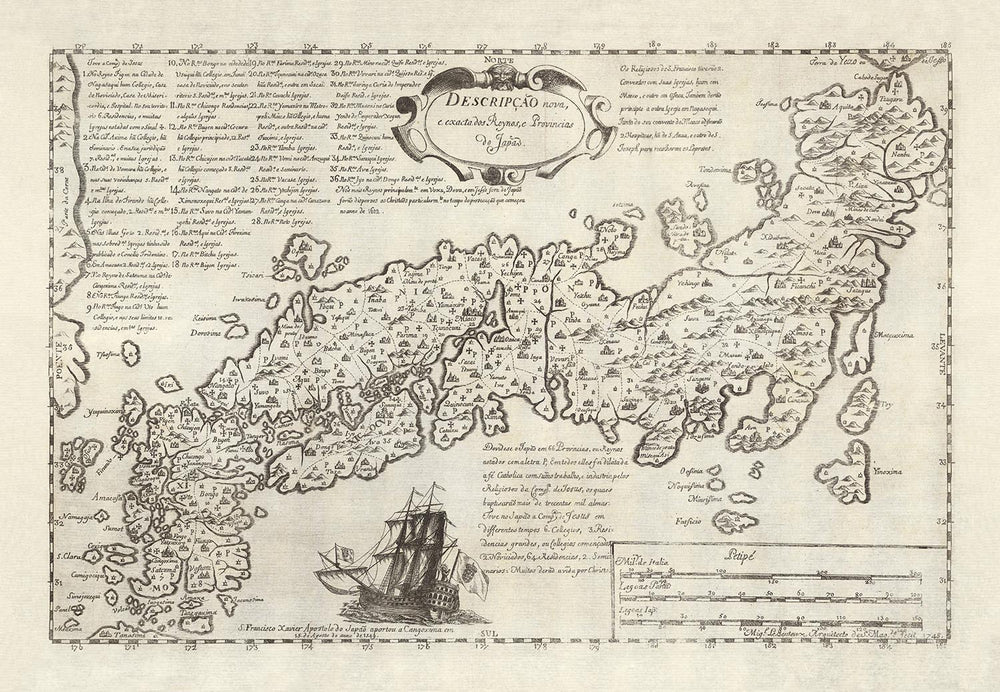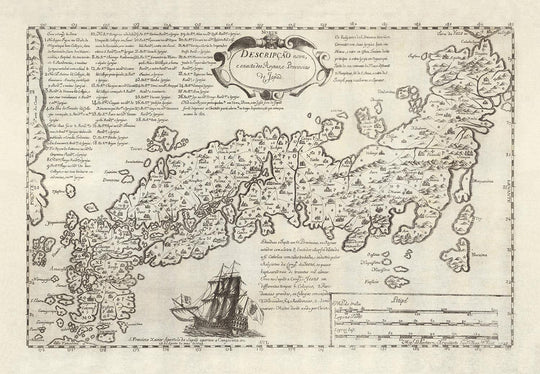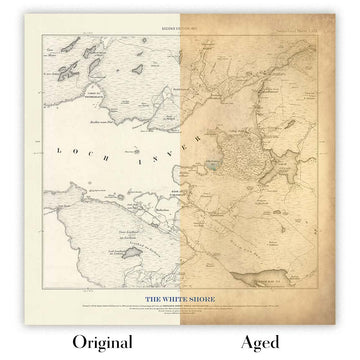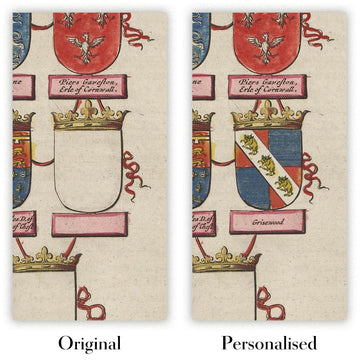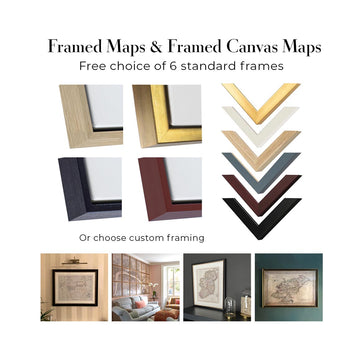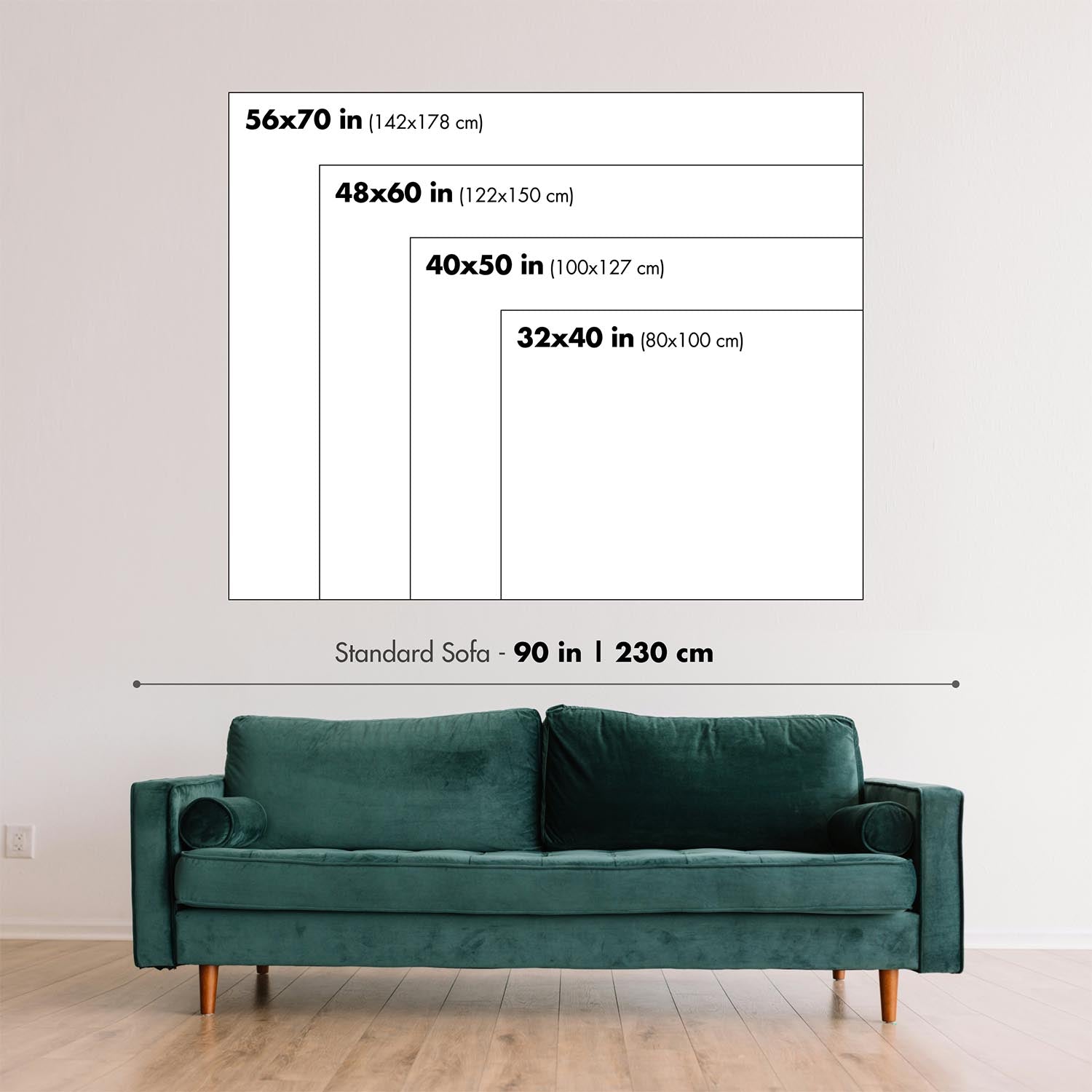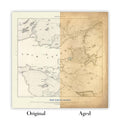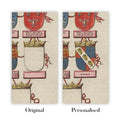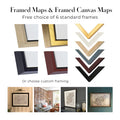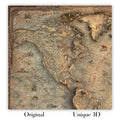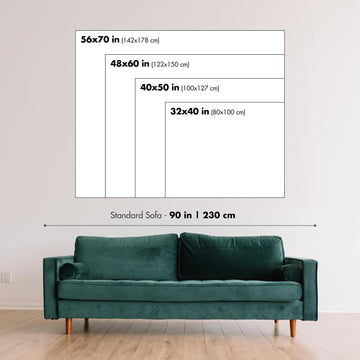- Handmade locally. No import duty or tax
- FREE worldwide delivery
- 90-day returns & 5-year product guarantee
- Questions? WhatsApp me any time
Own a piece of history
7,000+ 5 star reviews


If you've just finished watching "Shogun", you might be interested in this fascinating map. Originally crafted by the Portuguese Jesuits that brought Christianity to Japan, this map was created right around the time of the Edo or Tokugawa Shogunate.
Dive into the rich tapestry of East Asian geography with the esteemed map, "Descripcao nova, e exacta dos Reynos, e Provincias do Japao," a masterpiece crafted in 1679 by the distinguished Portuguese cartographer Inacio Moreira and later engraved by Miguel Le Bouteux in 1748. This map stands as a testament to the era of exploration and cultural exchange, illustrating not only Japan but also its neighboring regions including the coast of Korea. The map is meticulously detailed, showcasing the political and physical landscapes of these territories during a pivotal time in their history. Each province and city is rendered with precision, offering a window into the complex feudal structures and vibrant trade routes that defined the region.
The historical significance of this map is further enhanced by its connection to the Jesuit missions in Japan, particularly through the depiction of the sailing ship at the bottom, symbolizing the arrival of St. Francisco Xavier in Japan in 1549. This element of the map highlights the early interactions between Europe and Japan, spearheaded by figures like Xavier and his companions, who were among the first to introduce Christianity to Japan. The map's origins trace back to the lost manuscript by Moreira, derived from the traditional Japanese "gyoki" style maps, which were known for their unique cartographic conventions dating back to the 9th century. This blend of indigenous and European mapping techniques makes this map a fascinating artifact of cross-cultural exchange.
The map not only serves as a geographical guide but also as a historical document, capturing the dynamism of the region during a time of significant political and social evolution. It includes detailed representations of major cities such as Edo (modern-day Tokyo), Kyoto, and Osaka, which were critical centers of power, culture, and commerce during the period. The map also meticulously marks lesser-known locales, providing a comprehensive overview that would have been invaluable for navigators and traders of the time.
In addition to its rich detail and historical context, the map is a visual delight, adorned with a compass rose, intricate cartouches, and other decorative elements that reflect the mapmaking aesthetics of the era. The inclusion of various straits, seas, and other maritime features underscores the importance of naval routes in the region's trade and cultural exchanges. This map not only charts land but also narrates the stories of maritime exploration that were crucial to the global interactions of the 17th and 18th centuries.
For collectors and enthusiasts of cartography, history, or East Asian studies, this map is a prized possession that offers deep insights into the geopolitical landscape of the time. It serves as a bridge between different cultures and epochs, crafted by skilled hands that understood the value of accurate cartographic representation. Owning this map is akin to possessing a piece of history, a snapshot of a world that was just beginning to understand itself through the lenses of diverse cultures and distant shores.
Cities and towns on this map
- Edo (Tokyo) - 37,435,191
- Kyoto - 1,469,911
- Osaka - 2,733,706
- Nagoya - 2,302,614
- Kobe - 1,544,782
- Yokohama - 3,724,383
- Fukuoka - 1,601,286
- Sapporo - 1,959,062
- Hiroshima - 1,199,334
- Sendai - 1,082,113
- Chiba - 979,886
- Saitama - 1,324,301
- Kawasaki - 1,539,096
- Sagamihara - 725,626
- Urawa - 598,119
- Funabashi - 624,640
- Hachioji - 580,212
- Matsudo - 495,262
- Toyonaka - 402,183
- Sakai - 842,136
- Nishinomiya - 485,241
- Ashiya - 94,475
- Itami - 197,164
- Amagasaki - 463,322
- Higashiosaka - 505,476
- Yao - 275,941
- Kawanishi - 159,671
- Suita - 355,729
- Ikeda - 106,574
- Toyama - 416,006
- Kanazawa - 462,312
- Fukui - 269,571
- Toyohashi - 377,802
- Yokosuka - 426,182
- Kure - 228,558
- Okayama - 707,252
- Takamatsu - 338,939
- Matsuyama - 514,851
- Kochi - 342,923
- Nagasaki - 443,382
- Kagoshima - 605,297
- Naha - 321,459
Notable Features & Landmarks
- Primeira Parte Da Asia De Ioao De Barros
- Segunda Parte Da Asia De Ioao De Barros
- Terceira Parte Da Asia De Ioao De Barros
- Quarta Parte Da Asia De Ioao De Barros
- Decada Terceira De Asia De Antonio Galvao
- Decada Quarta De Asia De Antonio Galvao
- Decada Quinta De Asia De Antonio Galvao
- Decada Sexta De Asia De Antonio Galvao
- Decada Setima De Asia De Antonio Galvao
- Decada Oitava De Asia De Antonio Galvao
- Decada Nona De Asia De Antonio Galvao
- Decada Decima De Asia De Antonio Galvao
- Itinerario Do Arcebispo de Goa Dom Frey Aleixo de Menezes, Primaz da India Oriental, quando foy visitar a serra do Japão, pello Padre Fr. Antonio de Gouvea da Companhia de Jesu
- Relaçam Annual das Cousas que fizeram os Padres da Companhia de Jesu nas partes da India Oriental, & no Japao no anno de 1598. pello Padre Fernão Guerreiro da mesma Companhia
- Compass Rose
- Tropicus Capricorni
- Equinoctialis
- Tropicus Cancri
- Coroa
- Corea
- Ilhas Do Japao
- Ximo
- Amacusa
- Goto
- Firando
- Amakusa
- Xaxuma
- Omura
- Chicuço
- Hiuga
- Bungo
- Bugen
- Figo
- Noto
- Canga
- Etchu
- Hida
- Mino
- Owari
- Mikawa
- Totomi
- Suruga
- Idzu
- Kai
- Sagami
- Musasi
- Awa
- Kazusa
- Simotzuke
- Mutzu
- Dewa
- Sado
- Oki
- Tsushima
- Iki
- Goto
- Hirado
- Quelpaert
- Mar Vermello
- Golfo de Bengala
- Estreito de Singapura
- Mar da China Meridional
- Mar da China Oriental
- Mar Amarelo
- Mar do Japão
- Estreito de Tsushima
- Estreito de Quelpaert
- Estreito de Tartária
- Estreito de La Pérouse
- Estreito de Tsugaru
Historical and design context
- Title: Descripcao nova, e exacta dos Reynos, e Provincias do Japao
- Mapmaker/publisher: Inacio Moreira; Miguel Le Bouteux
- Date: 1679
- Engraved in 1748 by Miguel Le Bouteux
- The sailing ship at the bottom references S. Francisco Xavier, Apostle of Japan (Francisco Xavier, Cosme de Torres (1510-1570), and his arrival at Cangoxima on August 15, 1549.
- Derived from a highly important line of maps which began with Inacio Moreira's now lost manuscript map of Japan, constructed in the 1590s.
- Derived from an indigenous Japanese style of mapmaking called "gyoki" maps, using cartographic conventions which date to the 9th Century.
- Believed that Moreira's map derives from maps originally provided to the Jesuits by Buddhist clergy.
- One of the first European maps to accurately depict Japan.
- Detailed and accurate representation of the geography of Japan, showing the country's provinces, cities, towns, and rivers.
- Includes a key that explains the symbols used on the map.
Please double check the images to make sure that a specific town or place is shown on this map. You can also get in touch and ask us to check the map for you.
This map looks great at every size, but I always recommend going for a larger size if you have space. That way you can easily make out all of the details.
This map looks amazing at sizes all the way up to 70in (180cm). If you are looking for a larger map, please get in touch.
The model in the listing images is holding the 18x24in (45x60cm) version of this map.
The fifth listing image shows an example of my map personalisation service.
If you’re looking for something slightly different, check out my collection of the best old maps to see if something else catches your eye.
Please contact me to check if a certain location, landmark or feature is shown on this map.
This would make a wonderful birthday, Christmas, Father's Day, work leaving, anniversary or housewarming gift for someone from the areas covered by this map.
This map is available as a giclée print on acid free archival matte paper, or you can buy it framed. The frame is a nice, simple black frame that suits most aesthetics. Please get in touch if you'd like a different frame colour or material. My frames are glazed with super-clear museum-grade acrylic (perspex/acrylite), which is significantly less reflective than glass, safer, and will always arrive in perfect condition.
This map is also available as a float framed canvas, sometimes known as a shadow gap framed canvas or canvas floater. The map is printed on artist's cotton canvas and then stretched over a handmade box frame. We then "float" the canvas inside a wooden frame, which is available in a range of colours (black, dark brown, oak, antique gold and white). This is a wonderful way to present a map without glazing in front. See some examples of float framed canvas maps and explore the differences between my different finishes.
For something truly unique, this map is also available in "Unique 3D", our trademarked process that dramatically transforms the map so that it has a wonderful sense of depth. We combine the original map with detailed topography and elevation data, so that mountains and the terrain really "pop". For more info and examples of 3D maps, check my Unique 3D page.
For most orders, delivery time is about 3 working days. Personalised and customised products take longer, as I have to do the personalisation and send it to you for approval, which usually takes 1 or 2 days.
Please note that very large framed orders usually take longer to make and deliver.
If you need your order to arrive by a certain date, please contact me before you order so that we can find the best way of making sure you get your order in time.
I print and frame maps and artwork in 23 countries around the world. This means your order will be made locally, which cuts down on delivery time and ensures that it won't be damaged during delivery. You'll never pay customs or import duty, and we'll put less CO2 into the air.
All of my maps and art prints are well packaged and sent in a rugged tube if unframed, or surrounded by foam if framed.
I try to send out all orders within 1 or 2 days of receiving your order, though some products (like face masks, mugs and tote bags) can take longer to make.
If you select Express Delivery at checkout your order we will prioritise your order and send it out by 1-day courier (Fedex, DHL, UPS, Parcelforce).
Next Day delivery is also available in some countries (US, UK, Singapore, UAE) but please try to order early in the day so that we can get it sent out on time.
My standard frame is a gallery style black ash hardwood frame. It is simple and quite modern looking. My standard frame is around 20mm (0.8in) wide.
I use super-clear acrylic (perspex/acrylite) for the frame glass. It's lighter and safer than glass - and it looks better, as the reflectivity is lower.
Six standard frame colours are available for free (black, dark brown, dark grey, oak, white and antique gold). Custom framing and mounting/matting is available if you're looking for something else.
Most maps, art and illustrations are also available as a framed canvas. We use matte (not shiny) cotton canvas, stretch it over a sustainably sourced box wood frame, and then 'float' the piece within a wood frame. The end result is quite beautiful, and there's no glazing to get in the way.
All frames are provided "ready to hang", with either a string or brackets on the back. Very large frames will have heavy duty hanging plates and/or a mounting baton. If you have any questions, please get in touch.
See some examples of my framed maps and framed canvas maps.
Alternatively, I can also supply old maps and artwork on canvas, foam board, cotton rag and other materials.
If you want to frame your map or artwork yourself, please read my size guide first.
My maps are extremely high quality reproductions of original maps.
I source original, rare maps from libraries, auction houses and private collections around the world, restore them at my London workshop, and then use specialist giclée inks and printers to create beautiful maps that look even better than the original.
My maps are printed on acid-free archival matte (not glossy) paper that feels very high quality and almost like card. In technical terms the paper weight/thickness is 10mil/200gsm. It's perfect for framing.
I print with Epson ultrachrome giclée UV fade resistant pigment inks - some of the best inks you can find.
I can also make maps on canvas, cotton rag and other exotic materials.
Learn more about The Unique Maps Co.
Map personalisation
If you're looking for the perfect anniversary or housewarming gift, I can personalise your map to make it truly unique. For example, I can add a short message, or highlight an important location, or add your family's coat of arms.
The options are almost infinite. Please see my map personalisation page for some wonderful examples of what's possible.
To order a personalised map, select "personalise your map" before adding it to your basket.
Get in touch if you're looking for more complex customisations and personalisations.
Map ageing
I have been asked hundreds of times over the years by customers if they could buy a map that looks even older.
Well, now you can, by selecting Aged before you add a map to your basket.
All the product photos you see on this page show the map in its Original form. This is what the map looks like today.
If you select Aged, I will age your map by hand, using a special and unique process developed through years of studying old maps, talking to researchers to understand the chemistry of aging paper, and of course... lots of practice!
If you're unsure, stick to the Original colour of the map. If you want something a bit darker and older looking, go for Aged.
If you are not happy with your order for any reason, contact me and I'll get it fixed ASAP, free of charge. Please see my returns and refund policy for more information.
I am very confident you will like your restored map or art print. I have been doing this since 1984. I'm a 5-star Etsy seller. I have sold tens of thousands of maps and art prints and have over 5,000 real 5-star reviews. My work has been featured in interior design magazines, on the BBC, and on the walls of dozens of 5-star hotels.
I use a unique process to restore maps and artwork that is massively time consuming and labour intensive. Hunting down the original maps and illustrations can take months. I use state of the art and eye-wateringly expensive technology to scan and restore them. As a result, I guarantee my maps and art prints are a cut above the rest. I stand by my products and will always make sure you're 100% happy with what you receive.
Almost all of my maps and art prints look amazing at large sizes (200cm, 6.5ft+) and I can frame and deliver them to you as well, via special oversized courier. Contact me to discuss your specific needs.
Or try searching for something!







